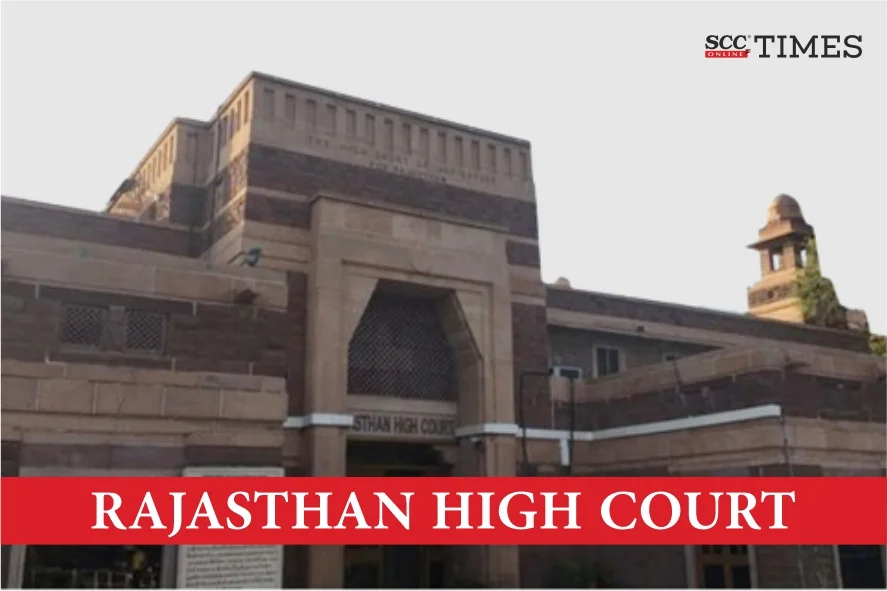Rajasthan High Court: In a batch of petitions seeking quashment of FIR stemmed from farmers’ protest against Jawai Dam water distribution, a single-judge bench of Farjand Ali, J., quashed the FIR and all consequential proceedings and stated that “every individual has the constitutional right to raise his voice against the actions of a public officer, especially if those actions directly impact their rights or livelihood.”
Factual Matrix
This batch of petitions arose from the registration of FIR alleged offences under Sections 117, 143, 283, and 353 of the Penal Code, 1860 (IPC_ and Section 8B of the National Highways Act, 1956 (NH Act) at Police Station Sanderav, District Pali, against 53 individuals including the lead petitioner. The FIR stemmed from a protest by farmers concerning the shifting of a traditional water distribution meeting related to Jawai Dam.
Historically, the meeting was held at Dam Inspection Bhawan, Sumerpur, a place accessible and symbolically significant to farmers. However, in deviation from practice, the meeting was shifted to a different venue in 2022, which provoked apprehensions among the farming community of being sidelined.
On 09-10-2022, approximately 700—800 farmers gathered near NH-62 to protest peacefully. The police, acting on administrative instructions, allegedly attempted to disperse the protesters.
Moot Points
- Whether a peaceful protest by farmers on a public highway constitutes unlawful assembly or abetment under the IPC?
- Whether such a gathering, in the absence of violence or damage, attracts Section 8B of the NH Act?
-
Whether the FIR and proceedings arising therefrom are liable to be quashed under the Court’s inherent powers under Section 482 of the Criminal Procedure Code, 1973 (CrPC)?
Court’s Observations
The Court observed that there was no evidence of violence, chaos, or public disorder at the protest. The Court noted that the FIR did not allege specific acts of mischief or injury to public property.
On Section 117 of the IPC, the Court held that “…the very nature of abetment vests in an act preceding the offence… Here in this case, the farmers were already perturbed… and nobody called them there…” Regarding unlawful assembly under Section 143 of the IPC, the Court stressed that there exists constitutional right to assemble peacefully under Article 19(1)(b) of the Constitution of India.
“…not every assembly can be deemed an unlawful assembly… mere expression of anguish… cannot be taken to mean that they share a common objective or have formed an unlawful assembly… Each individual faces their own hardship… mere expression of anguish in such circumstances cannot be taken to mean that they share a common objective or have formed an unlawful assembly.”
On obstruction under Section 283 of the IPC, the Court asserted that “…if people gather somewhere to assert their rights, the way will be blocked automatically… this does not mean they caused harm to anyone.” Further, for Section 8-B of the NH Act, the Court stated that “…there is no allegation or indication of any mishap or damage caused to the highway… their wrath and resentment… is natural.” The Court held that the ingredients for Section 353 IPC and Section 8B NH Act are not fulfilled as there was no use of force or criminal act committed by the farmers during the protest.
The Court observed that the farmers’ protest against Jawai Dam water distribution arose from genuine resentment and constituted an expression of democratic dissent. The Court reaffirmed the principle that peaceful dissent and constitutional right to peaceful protest is a cornerstone of democracy “of the people, by the people, and for the people,” and held that mere participation in such a protest does not amount to committing offences under Sections 117, 143, 283, and 353 of the IPC, or Section 8B of the NH Act.
“Preventing citizens from holding a peaceful protest through force or coercion cannot be justified… If simply opposing an officer’s decision results in the registration of a criminal case, it would reflect a mindset reminiscent of British colonial rule but surely not the spirit of a free, democratic nation governed by the rule of law”
Court’s Decision on Farmers’ protest against Jawai Dam water distribution
Invoking its inherent powers under Section 482 of the CrPC, and relying on State of Haryana v. Bhajan Lal, 1992 Supp (1) SCC 335, the Court quashed the FIR and all consequential proceedings and stated that
“In a democracy, of the people, by the people, and for the people, peaceful protest is a constitutional right.”
The Court directed the concerned SHO to submit a negative final report before the trial court. The Court further directed that the present order is applicable not only to the petitioners who appeared but also to all similarly situated individuals implicated in the same FIR.
With regards to petitioner’s gun license suspension, the Court held that “…the suspension is revoked hereby because it was made solely on the basis of lodging of the FIR referred supra which has been quashed now.”
[Ajaypal Singh v. State of Rajasthan, 2025 SCC OnLine Raj 2600, Decided on 21-05-2025]
Advocates who appeared in this case:
Mr. Nishant Bora and Mr. Yuvraj Singh, Counsel for the Petitioners
Mr. N.S. Chandawat, Dy.G.A., Counsel for the Respondents





